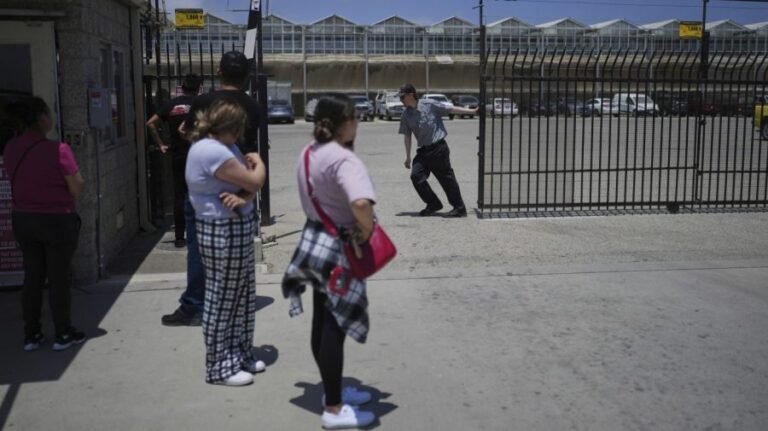
Sen. Ted Cruz (R-Texas) exulted when the U.S. Supreme Court recently vacated several lower court injunctions against President Trump’s executive order purporting to deny birthright citizenship for the children of “illegal entrants.”
Within hours, he posted a video declaring that “birthright citizenship is a policy that doesn’t make any sense,” even though it is the first sentence of the 14th Amendment to the Constitution: “All persons born or naturalized in the United States, and subject to the jurisdiction thereof, are citizens of the United States.”
Cruz has sponsored legislation to exclude disfavored children from the Constitution. Yet he was born in Canada in 1970, to an American mother and a Cuban émigré father. He has never been naturalized.
Cruz’s own citizenship derives not directly from the Constitution, but from Section 301 of the Immigration and Nationality Act, which applies to children born outside the U.S. to “parents one of whom is an alien, and the other a citizen of the United States.”
Because Cruz’s statutory citizenship arose at birth, he was likely eligible for the presidency, when he ran in the 2016 Republican primary, as a “natural born citizen” under Article II. It also means that he was never naturalized. He owes his citizenship to the technical application of a notoriously complex statute.
Under the law in 1970, Cruz’s mother, Elizabeth Darragh, could convey citizenship to him only if she had been “physically present” in the U.S. for 10 years before his birth, including at least five years after the age of 14. (This law has since been somewhat liberalized.)
Although Cruz has produced his mother’s birth certificate, showing that she was born in Delaware in 1934, that alone is insufficient to establish the necessary 10 years of “physical presence” in the U.S., with at least five of those years between 1948 and 1970.
A strict application of the law — of the sort Cruz seeks to impose on others — would require documentary evidence of Darragh’s qualifying presence in the U.S. prior to Cruz’s Canadian birth.
If Trump’s executive order or Cruz’s proposed statute had been in effect in 1934, Darragh’s birth certificate would not even constitute proof of her own citizenship, upon which Cruz’s citizenship depends. Rather, he would have to establish that one of Darragh’s parents had been a citizen or a permanent resident alien.
There is also some reason to wonder whether Cruz’s father had once violated immigration law. Raphael Cruz, Sr. came to the U.S. on a student visa in 1957, at age 18, speaking almost no English. Upon enrolling at the University of Texas, he worked washing dishes for “a mere 50 cents an hour.”
As Cruz put it, “Since he liked to eat seven days a week, he worked seven days a week” to put himself through school, graduating with a chemical engineering degree in 1961.
Rafael’s admirable work ethic may nonetheless have placed him “out of status.” In 1957, there were significant employment restrictions on student visa holders, allowing them to work only limited hours with permission from the district director of the Immigration and Naturalization Service, or “for practical training” if “required or recommended by the institution.”
The minimum wage in 1957 was $1.00 an hour, which at least suggests that Rafael was working off the books, possibly for cash, which has never been unusual for newly arrived teenagers who speak no English.
If so, there would have been no Immigration and Naturalization Service permission, no paycheck withholding, no social security contributions and perhaps no income tax payments, and consequently multiple immigration violations.
Rafael Cruz delayed becoming a U.S. citizen until 2005, when Ted was already solicitor general of Texas. The required forms would have included his employment and immigration history, including whether he had ever been out of status. There is no way to know whether Rafael Cruz disclosed his potentially unauthorized employment.
That is a seemingly small matter, but it might be enough to get someone deported in a regime run by White House Deputy Chief of Staff Stephen Miller and Homeland Security Secretary Kristi Noem.
I don’t mean to disparage the Cruz family, or to challenge the senator’s citizenship, but rather to show what happens when anyone’s immigration status is intensely questioned.
Statutes, and especially executive orders, can be fickle and unreliable, subject to misinterpretation, amendment, withdrawal or repeal.
Future children in Cruz’s situation — born abroad to only one American parent, with another who may have violated immigration laws — might or might not become statutory citizens, depending on the winds of nativism.
Under Trump’s executive order, the citizenship of virtually every newborn would potentially come under the same scrutiny, or more, than what I just applied above to the Cruz family.
The genius of birthright citizenship is the simplicity of the 14th Amendment. It does not require a deep dive into genealogy or the parsing of intricate regulations. There is no need to investigate parents’ or grandparents’ immigration status or length of residency, or to search for decades-old documentation. The only relevant inquiry is place of birth, which is enough to make people Americans.
I have two thoughts for Cruz. First, he should be careful what he wishes for. And in case he’s forgotten, “E Pluribus Unum.”
Steven Lubet is the Williams Memorial Professor Emeritus at the Northwestern University Pritzker School of Law.






